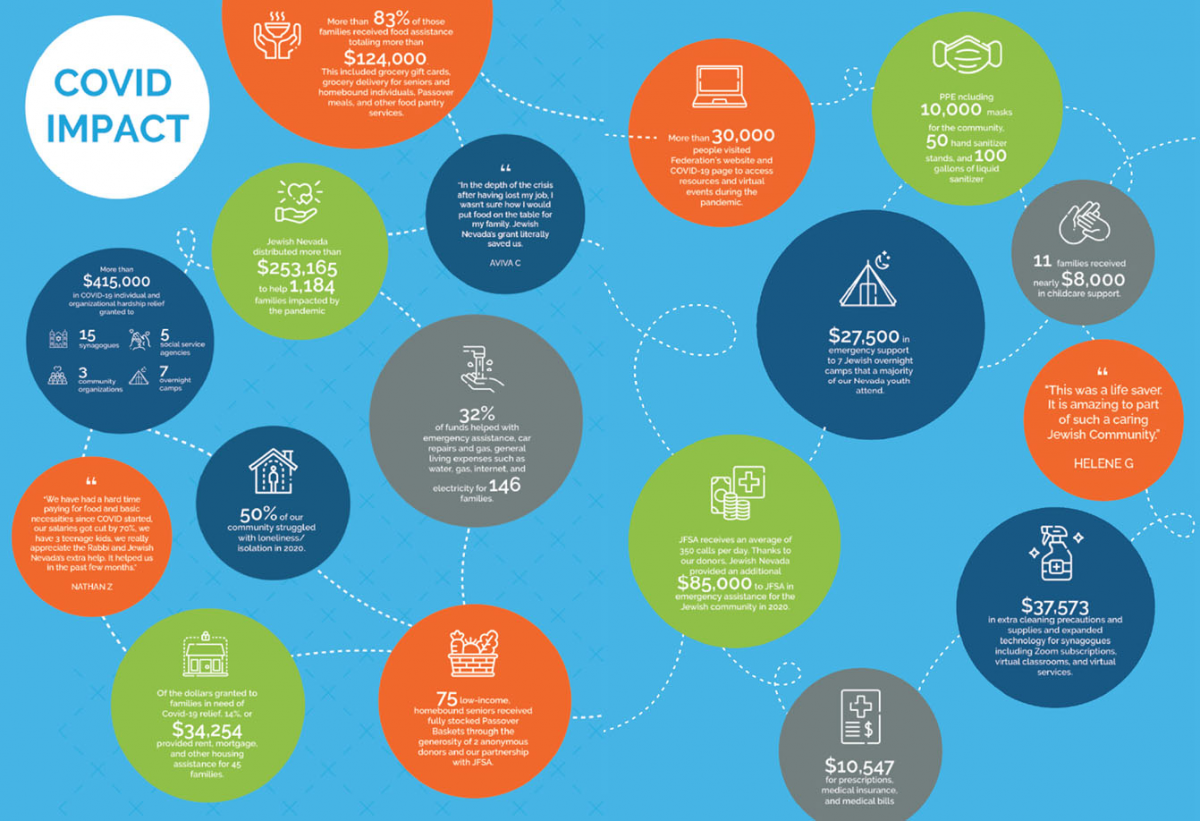Answering the Call

The global COVID-19 pandemic continues to wreak economic, physical, and psychological havoc around the world, leaving no community untouched. But many of Nevada’s nearly 70,000 Jews can rest a bit easier thanks, in part, to a Jewish commandment: The mitzvah (Hebrew for good deed) of tzedakah (charity).
The country’s largest Jewish philanthropy organization, the Jewish Federations of North America, rallied in response to the pandemic, collectively raising and allocating over $200 million to help their communities. Locally, Jewish Nevada has allocated more than $415,000 to local Jewish agencies, synagogues, and schools, as well as individuals and families.
“This is the core function of our organization,” explains Stefanie Tuzman, President and CEO of Jewish Nevada. “And because of the support of donors that contribute annually to our campaign, we are prepared to assess and address the needs of the community at any moment in order to provide the appropriate resources.”
When the public health crisis led Nevada Governor Steve Sisolak to declare a State of Emergency on March 12, 2020, Jewish Nevada immediately began mobilizing leaders and organizations. Together, they identified areas of need within the Jewish community. Soon after, the Federation’s board of directors committed $250,000 from emergency reserves for COVID relief.
“We didn’t waste time,” says Tuzman. “We listened and engaged in collaborative discussion, strategic planning, and data-based decision making at the onset of the pandemic.”
The fundraising agency has since provided hardship relief to 15 synagogues, five social service agencies, three community organizations and seven overnight camps as well as PPE, food, housing, living expenses, medical costs, and emergency assistance for families, seniors and homebound individuals. Other highlights of the agency’s efforts include:
- Fully stocked Passover baskets for 75 low-income seniors, thanks to two anonymous donors
- An $85,000 boost for the Jewish Family Services Agency
- Help securing Federal Paycheck Protection Program Loans for local Jewish organizations
- A COVID-19 resources page on the Jewish Nevada website, which has been accessed more than 30,000 times
- Virtual Jewish events as a way for the community to connect
- An infusion of expanded technologies for synagogues, such as Zoom subscriptions, virtual classrooms, and other virtual services
Rabbi Malcom Cohen’s synagogue, Temple Sinai, received a grant from Jewish Nevada. He called the money quite helpful and elaborated on tzedakah, explaining that it’s an obligation, and not just something you do when you feel good.
“In the very midst of a crisis, you can’t shy away from a responsibility,” he says, adding, “Jewish Nevada recognized a problem that needed fixing [by understanding the] implicit responsibility or burden that the Jewish community would feel for its members.”
Indeed, the pandemic has been a burden for the Jewish community, some more than others. One unnamed recipient of emergency funds called this tzedakah “a life saver” while another recipient, who was out of work, said it would cover basic bills.
“In the depth of the crisis, after having lost my job, I wasn’t sure how I would put food on the table for my family,” adds Aviva (no last name given), a recipient of emergency relief. “Jewish Nevada’s grant literally saved us.”
After receiving a grant from Jewish Nevada, the Las Vegas Community Kollel is now paying it forward.
“Some of our biggest donors had massive setbacks,” explains Rabbi Eliyahu Davidowitz, Director of Outreach and Development. “We’re very busy raising money to help them.”
In addition to the Jewish community’s access to food and basic necessities, Davidowitz worries about the emotional scars caused by the pandemic. “It was a difficult time and for many people, it still is,” he says.
In fact, Jewish Nevada claims that 50 percent of the community is dealing with loneliness and isolation.
“When you can’t come together as a community it can be very difficult,” says Davidowitz, noting the strain that COVID restrictions put on religious observances and celebrations. “We were very blessed that we embraced Zoom pretty early and were able to keep learning with people and keep growing.”
Overall, he is heartened by the generosity he sees at almost every turn. The most recent annual Kollel Chanukah toy drive, for instance, was the most successful one yet, bringing in thousands of toys for kids whose parents can’t afford them.
And when he picked up the phone to ask for donations, the answer was pretty much always ‘yes.’
“I felt an outpouring of support,” he says. “People understood that if they were able to give, this was the time to give.”
